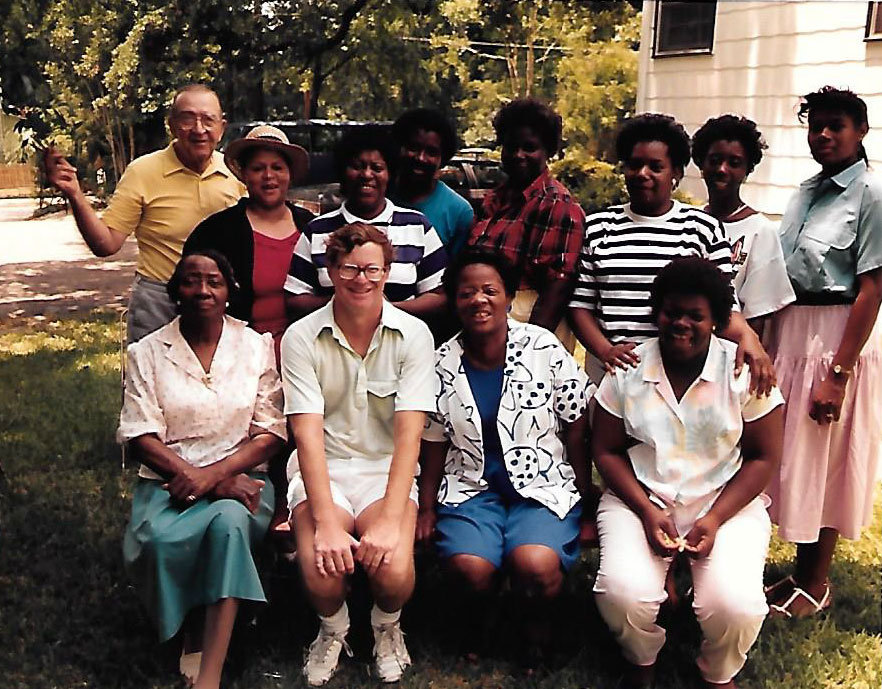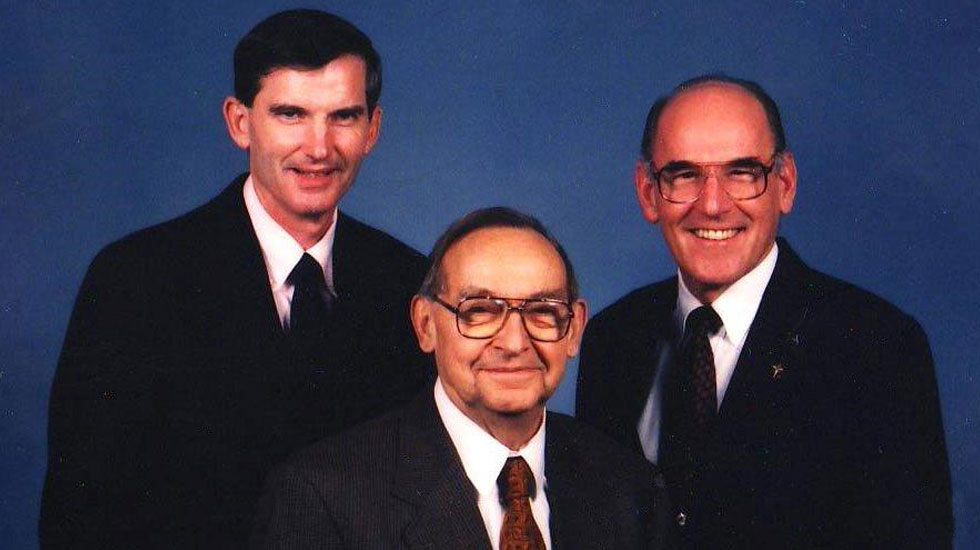
Brother Leonard (front) and Brother Alphonse (back left) with faculty members of the school in Orangeburg, SC.
In his Apostolic Letter to those in Religious Life, Pope Francis, in speaking about “living the present with passion,” writes:
Recalling our origins (“grateful remembrance for the past”) sheds light on yet another aspect of consecrated life. Our founders and foundresses were attracted by the unity of the Apostles with Christ and by the fellowship which marked the first community in Jerusalem. In establishing their own communities, each of them sought to replicate those models of evangelical living, to be of one heart and one soul, and to rejoice in the Lord’s presence (cf. Perfectae Caritatis, 15).
Living the present with passion means becoming “experts in communion,” “witnesses and architects of the ‘plan for unity’ which is the crowning point of human history in God’s design.”
In thinking about the hopes for the establishment of the Orangeburg community in 1984, one of the clear aspirations was for a community in mission that would, by its very presence, be a witness to gospel living. How well this aspiration was fulfilled is evidenced by the reflections of some of the Brothers who were members of the community.
I think the spirit of our regular schedule of common prayer and liturgy and our regular community meetings carried over into what I treasure the most – our evening meals at which, almost always, all were present. At these repasts, prepared by Brothers who each had a distinct repertoire of culinary talents, we found out what each of us was doing in his ministry – at the school, the religious education program, the campus ministry program at South Carolina State College, and the Cooperative Church Ministries of Orangeburg. The sometimes hard edges of our distinct personalities were softened by the humor and mutual acceptance that suffused the dining atmosphere.
I really felt like we all connected with the people we served in our ministries, and our house was always open to them to share meals, prayers, celebrations. As time went on, more and more people were talking about “the Brothers” and “the Brothers’ house”. Parishioners, our low income neighbors, the school’s faculty, the State College’s students, and all the people who came to talk with me as a result of my connections with the Cooperative Church Ministries of Orangeburg and the St. Vincent de Paul Society – all felt welcome at the Brothers’ house.
(Brother Jerry O’Leary)
Community life in Orangeburg was by far my best experience of community life. The enthusiasm each brought to his particular ministry, willingness to assist each other in those works, living far from our families, our relationship with the Redemptorists and with our Amelia and Treadwell Street neighbors, sharing household tasks in that big rambling old house, and a prayer life that was varied, regular, and open to our neighbors were all factors contributing to a wonderful community experience. There is no doubt in my mind that the Community’s presence, life, and labors in Holy Trinity Parish and in the city of Orangeburg were a true sign and witness of Jesus Christ and His church.
(Brother Leonard Wojtanowski)
From the start, upon arriving at 710 Amelia Street, Orangeburg, we worked and prayed well together, respecting and appreciating each other’s gifts. We were definitely a band of brothers who mutually helped and encouraged one another—and who worked well together. I felt so blessed to be a part of this “outreach” mission that participated in ever-new ministries, the impetus being the myriad needs of the larger community. Jim Connolly’s leadership in that regard was invaluable to us as a community and to me personally. Jim’s approach reminds me of Stanford’s Carol Dweck’s distinction between a fixed mindset and a growth mindset when it comes to responding to challenges. It was Jim’s companionship and encouragement that got me involved in many of the ministries I undertook and enjoyed. In addition to our more substantial involvements in the elementary school as principals and religion teachers; in parish life providing leadership in religious education, liturgies, and the choir; in prison ministry; teaching at State College; and as chaplains at the colleges, State and Claflin College both; we took on tutoring neighborhood children on Saturday mornings, serving as guardians ad litem in court on behalf of children, teaching reading to adults using the Laubach reading method and materials, and providing sandwiches and provisions—including an occasional “package,” as the locals termed a money loan, that might or might not be repaid! From time to time, our openness cost us something taken, but that was rare—due to the respect the Brothers—and the Sisters living in this home before us—had earned over the years.
(Brother Paul Cullen)
Living in a community of Brothers who were truly doing mission work in Orangeburg was inspirational on many fronts. The Brothers on Amelia Street became part of the fabric of life among the African-American population, the Orangeburg poor and the Catholic community of Holy Trinity Catholic Church. Truly our apostolate among the people we served drew its strength and direction from the Brothers living together on Amelia Street. Life in Orangeburg in an African-American section of town, saw the brothers embraced and enriched by daily life of the people.
(Brother Raymond Hoyt)
As we Brothers, Associates and Collaborators continue to “live the present with passion” how do we live up to the challenge of Pope Francis to become “experts in communion”? What can the experience of the Brothers who were part of the Orangeburg mission teach us about how we live community, whether that is the lived community of a Brothers’ residence, a school community or as Associates in communion with the Brothers? Sharing a meal, encountering those on the margins, respecting and appreciating each other’s gifts – as well as helping to develop each others gifts – were hallmarks of the Brothers presence and life in Orangeburg.
Pope Francis refers to such practices as “living the mysticism of encounter, which entails the ability to hear, to listen to other people; the ability to seek together the way.” While the Orangeburg mission was not a “utopia,” it was an experience of mission that was lifegiving for the Brothers as well as those who came in contact with them. There was no real discernible distinction between those who were actively engaged in mission full-time and other Brothers who were retired or semi-retired. All contributed to the witness of the Brothers, all participated in living the ‘mysticism of encounter.’ There was a vibrancy to their individual lives and to their lives as a community.
The Holy Father concludes his section on “living the present with passion” in his Apostolic Letter by writing
In a polarized society, where different cultures experience difficulty in living alongside one another, where the powerless encounter oppression, where inequality abounds, we are called to offer a concrete model of community which, by acknowledging the dignity of each person and sharing our respective gifts, makes it possible to live as brothers and sisters.
The Orangeburg experience can serve as one model of how we can “live the present with passion” today and also serve as a witness to the kind of evangelical communal living that was a hallmark of the early Christians and remains a sign of the loving presence of the Risen Jesus among us. In next week’s reflection focused on “embracing the future with hope” we’ll have the opportunity to see additional comments from Brothers who shared life in Orangeburg and how that experience informs the way they “embrace the future with hope.”
